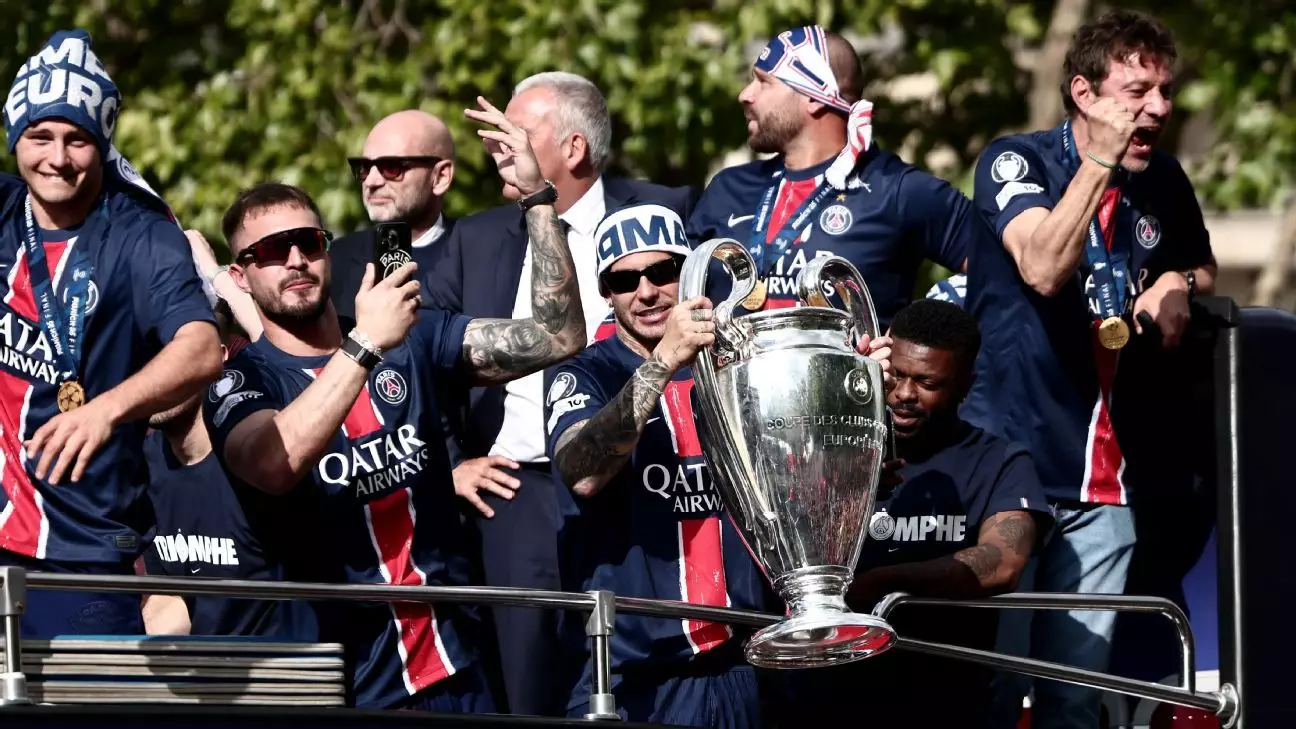Paris Saint-Germain (PSG) has long been a titan in the football world, but their recent ascent to Champions League glory has fostered an exuberant atmosphere paralleled by the unavoidable shadows of societal issues. The atmosphere was electric as fans gathered for an open-top bus parade, a celebration of not just a win against Inter Milan but a long-awaited achievement that has eluded the club for years. As captain Marquinhos hoisted the coveted Champions League trophy high above the throngs of dedicated supporters, the streets of Paris gained a sense of vibrancy unique to the beautiful game’s most prestigious event.
But this jubilant celebration was not just a joyous gathering; it was a potent demonstration of what can happen when victory unshackles national pride and loyalty within a community. The iconic Champs-Élysées, typically a symbol of unity and grandiosity, became both a corridor of triumph and a site marred by violence. Fans dressed in PSG’s colors of blue and red brought the avenue alive, yet the celebration unfolded against a backdrop that lost its narrative focus due to tragic events.
A Night to Remember, But Not Without a Price
The triumphal night following PSG’s victory for the Champions League title was clouded by chaos. Reports indicate that while many revelers rejoiced in the victory, not everyone was caught up in the euphoria. Tragedy struck in Dax and Paris, with casualties reported due to violent incidents that overshadowed the festivities. A tragic stabbing and a fatal accident underscored a stark reality: celebratory fervor can quickly devolve into tragedy when public gatherings go awry.
Highlighting the first stark incident, a teenager lost his life during a street celebration, a leader in a moment that holds little relation to football itself. This was a wake-up call about the volatility that can surface in large gatherings, showcasing a fracture in the fabric of such a joyous occasion. The violence did not end there, as other incidents were reported during what should have been a night of collective jubilation. A police officer injured during the celebratory chaos emphasizes the unforeseen consequences of fervent celebration; it illustrates the thin line between joy and despair.
The Club’s Responsibility
As PSG basked in their victory lap, the club’s representatives were acutely aware of the implications surrounding the violence. Addressing the media, PSG’s spokesperson affirmed that the actions of a few despicable individuals should not define the excellent character of the club or its fans. For PSG, this contradiction poses an ethical dilemma—how to celebrate a momentous milestone while grappling with the fallout from those who misappropriate public joy for petty violence.
Even in the face of the exuberance that surrounded the presentation of the Champions League trophy, PSG’s recognition of the negative aspects reflects a club deeply entwined with its social responsibilities. PSG’s condemnation of the violence and assurance of a focus on collective joy speaks to a broader understanding of how football clubs can shape societal narratives and influence behaviors within their fan base. In the age of social media and heightened public scrutiny, clubs possess the power to lead through influence in positive, impactful manners.
Security and Public Safety at the Forefront
In recognizing the profound implications of mass gatherings, authorities deployed extensive security measures to maintain order during the celebratory events. The presence of riot police, shutdowns of major roads, and tactical strategies underscore the seriousness with which public safety was treated. This not only protected attendees but also aimed to curtail the potential for violence as crowds swelled outside the stadium and spilled onto the streets.
However, the efficacy of these measures sparks debate. Just as Paris was gripped by the glory of PSG’s success, the wave of violence brings a conversation about how public celebrations must evolve. The delicate balance between ensuring public safety and allowing the spirit of the occasion to flourish presents a formidable challenge for authorities moving forward. As France prepares for further sporting events, including the French Open, maintaining a harmonious public atmosphere will require both vigilance and adaptability.
Lessons for the Future
The dual narrative of celebration and chaos out of PSG’s historic Champions League title serves as a learning opportunity for both clubs and fans alike. As the echoes of joy dispersed among the dense Parisian air, the incidents of violence raised critical questions about what it means to collectively celebrate victories in an increasingly complex social landscape.
Beyond mere celebration, a culture of accountability is essential to ensure that joyous occasions do not devolve into tragedies. The hope is that fan communities can actively engage in standards of conduct that portray the essence of football as a source of joy rather than chaos. After all, every triumph should not just resonate with the clink of trophies but also embody unity, compassion, and, above all, a profound respect for life itself.

